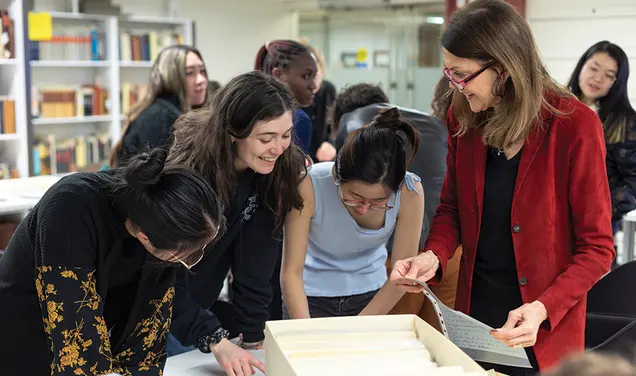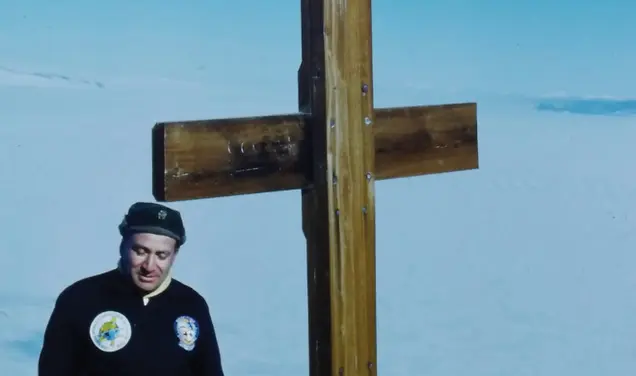The salesman
Lud Gutmann ’55 recalls the day a scholarship student and his parents went to Langrock's to pick out a suit for graduation
Our red Ford pickup truck, dulled and tarnished from years of heat, rain, and cold, stood in the shade of the chicken house feed room. It sagged under the weight of the hundred-pound sacks of grain I was piling neatly in its bed. I paid little attention to the routine work, thinking about my summer job at a nearby restaurant, adding up the amount of possible tip money to go with the scholarships I had for medical school in the fall, and wondering if it would do. The last final exams had been three days before, and Princeton’s graduation was still two weeks away. Helping out on the farm was an expected time-filler.
I looked up to see Mom walking briskly down the rough gravel path toward me. Her determined look predicted a plan for this warm spring morning. Could be good or could be bad – anything was possible.
“I think you need a new suit. How about we drive over to Princeton and buy one?” she announced, her hands firmly planted on her hips. She turned away immediately; it wasn’t really a question. “I’ll talk to your father,” she said, her face toward the hen house. It seemed like a good idea to me – it beat moving heavy bags of feed. I kept on working, even though I knew her idea was now a plan of action.
Dad was coming from the nearby chicken house, carrying two wire buckets filled with freshly laid eggs. I knew he’d enjoy a break, but I wasn’t sure he’d want to go with us on my mother’s errand. She hadn’t learned to drive, but she and I could have made the trip alone. It was unusual that she seemed to want support for this one. My father handed me the keys and went into the house to clean up. Twenty minutes later the three of us were on our way on the short drive through the New Jersey countryside.
Going to Princeton was no longer the awe-inspiring event of a few years before. True, the gothic towers and peaked roofs rising above the trees still seemed out of place in the midst of the New Jersey farmlands, but they had lost their mystique for me after four years. The imposing stone walls felt like home.
In 1955, once classes were finished in May, Princeton, like other college towns, turned back from an active, student-packed place into a sleepy little village populated only with permanent residents. The traffic jams on Nassau Street, students filling the sidewalks as they shopped at the men’s stores or had a snack at the Balt, and families peering at the Firestone Library, the soaring gothic chapel, and historic Nassau Hall, were momentarily scenes of the past. The campus was deserted. An occasional unseen power mower broke the silence – like a distant thunderstorm breaking the stillness of a quiet spring morning. Overtime workers were getting the campus dressed for the upcoming graduation and alumni Reunions.
“Where do you want to go?” I asked my mother. No sense in asking Dad; he always stepped back in these situations.
“I suppose Langrock’s. They’re the best shop?” my mother asked.
“They’re pretty fancy and expensive,” I replied, but I knew what she would say.
“That’s where we’re going.”
I parked our aging green Chevy sedan in front of Langrock’s. The large clothing-store display window was ascetically trimmed in white and, in contrast to the fussily overfilled shops nearby, held only three suits. The headless mannequins wore Princeton cravats around their necks and their suits were the accepted classic styles, expensively cut from expensive fabrics and, I was sure, sporting expensive price tags. There was only one other car parked on the street. An elderly couple out for their late-morning walk smiled at us as we walked toward them.
I’d been to Langrock’s before with a few of my friends, but had never bought anything. Like the rest of the new breed of scholarship students with little disposable cash, I’d found more inexpensive outlets for my clothing needs. Fortunately for us, chino pants, white T-shirts, and scuffed white buckskin shoes (the scuffed effect was important) were the accepted student outfits.
On this quiet weekday morning, Langrock’s was uninhabited except for more mannequins wearing summer suits and standing at attention along two walls, wooden racks with neatly hung suits and jackets, and two salesmen, almost hidden by the counters covered with an assortment of dress shirts, rep ties, and lightweight sweaters. The salesmen were lounging over coffee in the back of the shop and glanced at us without interest. We were the only customers in the store. One of the salesmen ignored us and continued to read his magazine. The other walked over slowly, making a careful appraisal of the three of us. I had seen him before and knew he had spent years catering to the University’s wealthy and privileged students. Like the other salesmen in Nassau Street’s exclusive shops, the sales staff mirrored the elitist and superior attitudes of their clientele.
We didn’t measure up at all. There was my dad, still in his unpressed work pants and shoes. He wore one of his old blue silk shirts, its detachable collar long gone, that had seen better days in Germany. It still had smudges on the sleeves from painting the chicken houses earlier in the spring. His leather shoes, originally fine quality, were in worse shape than the shirt.
Mom wore a simple patterned housedress, bought in Woolworth’s, which had survived a multitude of washings. Her hair was its usual untamed bramble of curls. I was the most fashionable, or at least acceptable, in my white T-shirt and khaki shorts.
The salesman’s assessment was less than favorable. He wore the same superior and imperious look so carefully cultivated by some of my more class-conscious school-mates. Mom, busy looking at the racks of suits, paid no attention to him. Dad watched, bemused, and soon found a chair, the better to observe at a distance. He opened his newspaper.
“I suppose you’re just looking around,” the salesman said with slow emphasis. He clearly wanted to get back to his coffee. He had no “Welcome to Langrock’s” for us and no “What can I do for you, madam?” for my mother. His carefully creased gray trousers, white shirt, and orange-and-black-striped tie enhanced his self-ordained aura of disdain. His nose lifted a notch higher as he watched my mother run her hands across the suits, feeling the goods for quality. I could imagine him thinking, what could she possibly know of quality?
In his eyes, we were farmers. He was only interested in important customers – ones who could pay full freight. Left unsaid were the usual friendly comments made to clinch and perhaps expand the sale, such as “Free alterations? Of course, Madam” or “Those socks would go well with that suit, sir” or “Permit me to suggest a tie…” No such thoughts crossed this salesman’s mind as he studied us and wished us gone. My father sat in his chair, seeming to read his newspaper.
“Actually, we want to buy our son a suit. He doesn’t have one,” Mom finally said with her heavy German accent. I thought I heard the salesman let out a small groan.
“I guess you folks are farmers,” he replied, his tone exasperated. “You probably don’t get into town too often. Are you really sure this is where you want to buy a suit?”
There, he had said it – farmers. That’s us to him, I thought, just farmers who had wandered in.
“Oh yes, a suit for my son,” she replied, her smile radiating her European charm. “He says this is the place to come,” gesturing at me.
The salesman looked me over and shrugged. He stepped over to the rack to pick out several suits when my mother added, “The suit has to be ready in a week since our son graduates from the University here in two weeks. Perhaps you can suggest a tie and shirt as well? I assume alterations are free?”
The salesman stopped, momentarily caught off guard. Mom kept right on with her assault: “Our younger son will be a freshman here this fall.” My father looked over the top of his newspaper.
The salesman was now in full retreat.
“Can you show us something in charcoal gray?” she asked, smiling broadly.
“Yes, madam. Will madam wish to select shoes for the graduate? We will be pleased to fit her other son, as well.” His large smile glowed with false sincerity. I didn’t look at my father. I was sure he had lowered his newspaper to his lap and taken off his glasses. I could picture his expression.









No responses yet